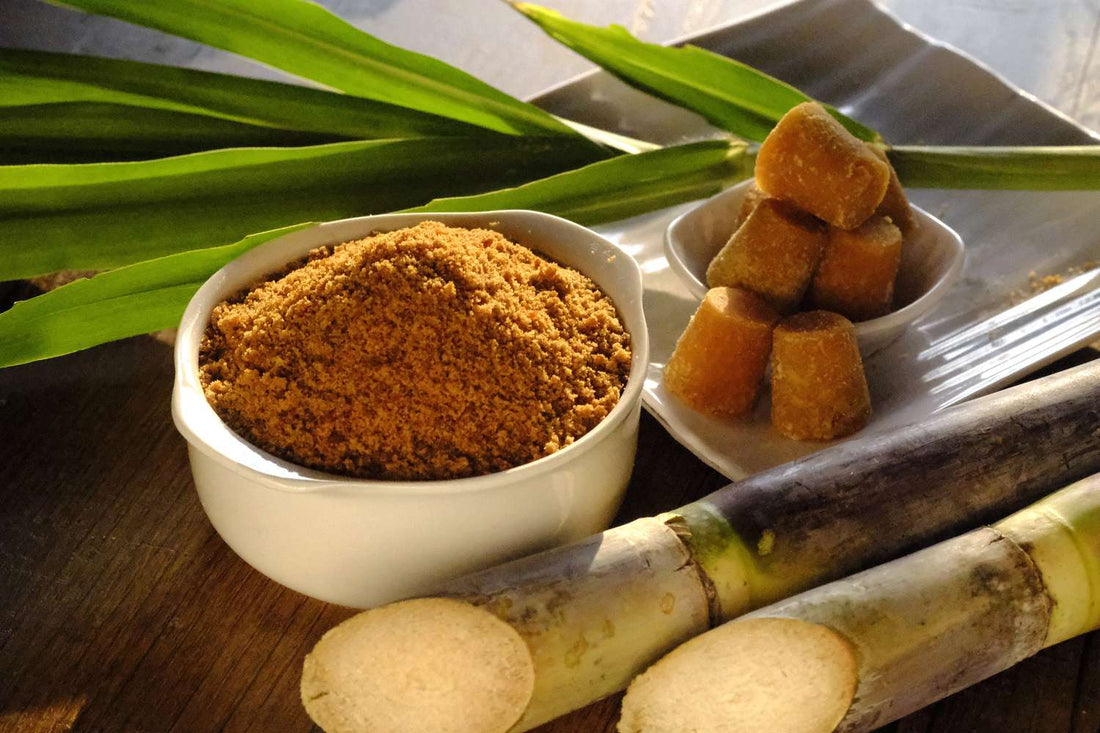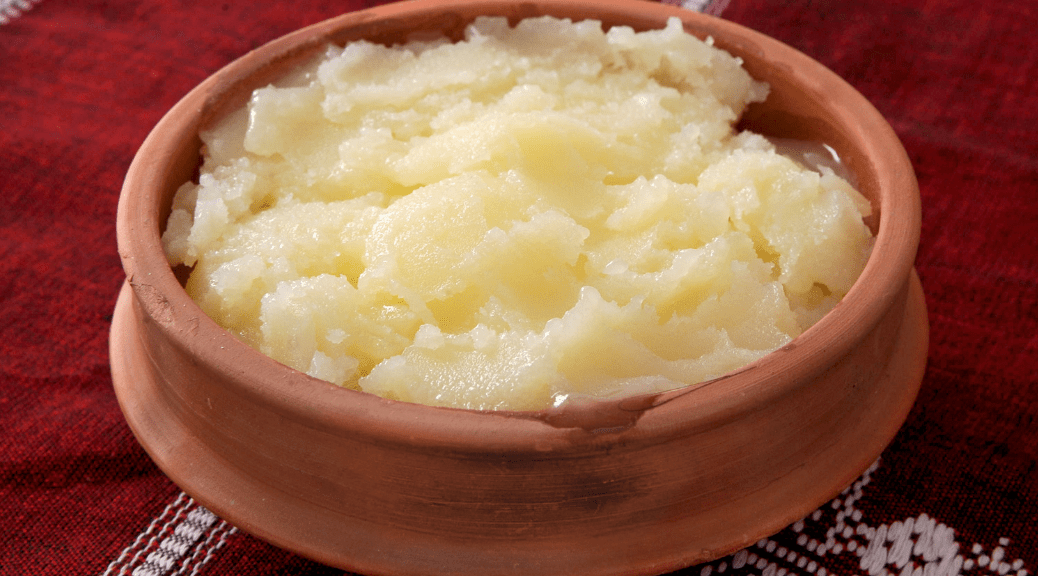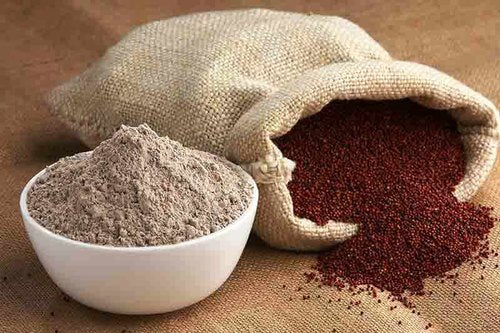






The Sweet Wisdom of India: Discovering the Types, Benefits, and Ayurvedic Significance of Jaggery
In India, food is more than nourishment — it’s a connection to culture, tradition, and ancient healing practices. One such timeless ingredient is jaggery, or gur, a natural sweetener cherished in Indian kitchens for centuries. From festivals and rituals to Ayurvedic medicines and everyday meals, jaggery has earned its place as a symbol of warmth, wellness, and heritage.
Let’s explore what makes this golden delicacy so special — from its origins and types to its impressive health benefits and Ayurvedic wisdom.
What is Jaggery?

Jaggery is a traditional, unrefined sweetener made by boiling down sugarcane juice or the sap of palm trees until it solidifies into blocks, balls, or powder. Unlike refined white sugar, which is heavily processed and stripped of nutrients, jaggery retains trace minerals and vitamins like iron, calcium, magnesium, and potassium.
It is known for its rich, earthy, caramel-like flavor and is often used in Indian sweets, beverages, and even savory dishes. Beyond its taste, jaggery holds therapeutic value, especially in Ayurveda, where it’s recognized for its natural detoxifying and energy-boosting properties.
Types of Jaggery
Jaggery comes in different varieties depending on its source and preparation method. Here are the most popular types:
-
Sugarcane Jaggery:
The most commonly used type, made from fresh sugarcane juice. It’s golden to dark brown in color with a rich, molasses-like flavor. -
Palm Jaggery (Taad Gur):
Made from the sap of palm trees, this jaggery has a darker hue and deeper, smoky flavor. It’s widely popular in South India. -
Date Palm Jaggery (Khajur Gur):
A winter delicacy made from the sap of date palms, mostly in Bengal. Known for its soft texture and delicate, toffee-like taste. -
Coconut Jaggery:
Produced from coconut palm sap, this variety has a mild, distinct flavor and is commonly used in coastal regions of India. -
Granular/Powdered Jaggery:
Jaggery in a crushed or powdered form, ideal for quickly mixing into beverages or dishes.
Each type carries its own unique flavor, color, and nutritional profile, and they are all valued both as food and medicine in Indian tradition.
The Health Benefits of Jaggery: A Natural Sweetener for Better Living
Jaggery is much more than just a natural sweetener — it’s a wholesome, nutrient-packed alternative to refined sugar that supports overall well-being. Known for its rich, earthy flavor and health-enhancing properties, jaggery has been a staple in Indian diets for centuries. Packed with essential minerals and antioxidants, it offers a wide range of benefits for those aiming to lead a healthier, more balanced lifestyle.
Why Gur is Good for Your Health
Jaggery, also called gur in many parts of India, is a powerhouse of nutrients. It’s rich in vital minerals like iron, calcium, magnesium, and potassium — all essential for the body’s natural functions. These nutrients not only help strengthen bones and improve digestion but also boost the immune system.
One of the most notable benefits of jaggery is its high iron content, which plays a crucial role in forming hemoglobin. This helps improve oxygen circulation in the blood and can prevent iron-deficiency anemia, a common concern especially among women and children.
Jaggery and Weight Management
While it may seem unusual to associate a sweetener with weight loss, jaggery has earned its place as a smart alternative to refined sugar. Thanks to its higher fiber content and nutrient density, it offers several digestive benefits that can indirectly support healthy weight management.
How Jaggery Supports Weight Loss:
-
Boosts Metabolism:
Loaded with minerals that enhance metabolic activity, jaggery helps the body process calories more efficiently. -
Reduces Sugar Cravings:
The natural sweetness of jaggery satisfies sweet cravings, reducing the temptation for processed, sugary snacks. -
Improves Digestion:
It activates digestive enzymes, which promote smoother digestion and help prevent bloating — both important factors in maintaining a healthy weight.
When consumed in moderation, jaggery can be a smart addition to a balanced diet aimed at weight control.
The Role of Jaggery in Ayurveda
In Ayurvedic medicine, jaggery is regarded as a ‘heating’ food that energizes the body, improves digestion, and purifies the blood. It is often used in traditional remedies and seasonal diets to maintain internal balance and prevent health issues.
Detoxifying and Blood-Purifying Properties:
Jaggery aids the natural detoxification process by helping to flush toxins from the body. It supports liver function and cleanses the digestive system. Its rich iron content also helps in purifying the blood, making it beneficial for those prone to anemia or low hemoglobin levels.
For Respiratory Wellness:
Ayurveda recommends using jaggery, especially during colder months, to treat respiratory conditions like cough, asthma, and congestion. When combined with ingredients like ginger, turmeric, or black pepper, it helps clear mucus, soothe the throat, and support overall lung health.
Simple Ways to Use Jaggery in Your Diet
Incorporating jaggery into your everyday meals is easy and delicious. Here are a few ideas:
- Add it to your tea or coffee:
Swap out refined sugar with jaggery for a naturally sweet, nutrient-rich beverage. - Blend it into smoothies:
A small piece of jaggery adds a unique depth of flavor to fruit and nut smoothies. - Use it in cooking:
Mix jaggery into dals, curries, and sauces to balance spicy and tangy flavors. - Enjoy it as a natural snack:
A small chunk of jaggery can be enjoyed post-meal to aid digestion and curb sweet cravings.
Where to Buy Organic Jaggery
When selecting jaggery, it’s important to choose pure, organic varieties free from chemicals, artificial colors, and preservatives. Organic jaggery retains more of its natural minerals and offers superior health benefits.
Buy Organic Jaggery from Organic Soul
For those seeking premium-quality jaggery, Organic Soul offers a thoughtfully crafted organic, chemical-free jaggery. Made using traditional and sustainable methods, our jaggery is free from synthetic additives and preservatives, delivering pure, wholesome sweetness to your kitchen. Whether you’re sweetening beverages, desserts, or traditional recipes, Organic Soul Jaggery promises authentic taste and nourishing goodness in every bite.
Why choose Organic Soul?
- Certified organic and natural
- No artificial additives or preservatives
- Sustainably sourced and traditionally prepared
You can explore the full range of Organic Soul’s products online and have them delivered right to your doorstep — making it easier than ever to embrace this age-old wellness ingredient in your modern lifestyle.
Conclusion
Jaggery is more than just a natural sweetener. It’s a nutrient-rich, Ayurvedic-approved ingredient with powerful health benefits — from improving digestion and detoxifying the body to boosting energy and supporting respiratory wellness. When enjoyed in moderation and sourced from trusted brands like Organic Soul, it can be a simple, flavorful, and nourishing addition to your daily routine.
FAQS
Q1. Is jaggery better than white sugar?
Yes, jaggery is far healthier than refined white sugar because it retains natural minerals and is less processed. It offers additional health benefits like aiding digestion, detoxifying the body, and boosting energy.
Q2. Can people with diabetes consume jaggery?
Though jaggery is more nutritious than sugar, it still has a high glycemic index. People with diabetes should consume it in moderation and consult a healthcare professional before adding it to their diet.
Q3. How much jaggery is safe to eat daily?
A small piece of jaggery (5-10 grams) per day is considered safe for most healthy adults. Excessive consumption should be avoided as it still contributes to overall calorie and sugar intake.
Q4. Is organic jaggery better than regular jaggery?
Yes — organic jaggery is made without chemicals, artificial colors, or preservatives, preserving its natural nutrients and health benefits.
Q5. How should jaggery be stored?
Store jaggery in an airtight container in a cool, dry place. Powdered or granular jaggery should be kept sealed to prevent moisture absorption.
Q6. Can jaggery help in weight loss?
When consumed in moderation, jaggery can aid digestion and reduce water retention, indirectly supporting weight management. However, it should not be consumed excessively.
